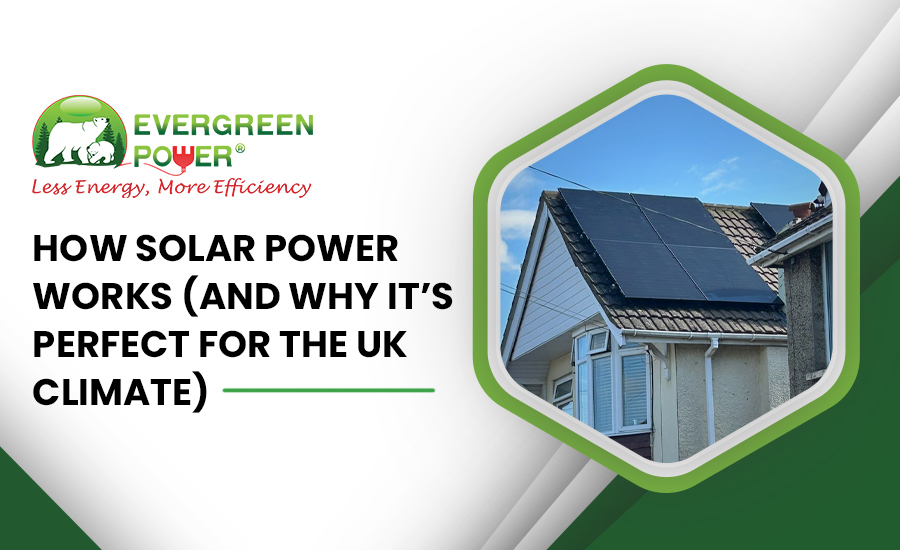
How Do Solar Panels Work
Let’s Clear Something Up First
If you’ve ever looked out your window at grey skies and wondered, “Can solar panels even work here?”, you’re not alone. It’s a fair question. After all, we’re not exactly swimming in sunshine.
But here’s the thing most people don’t realise: solar panel ground mounts don’t need bright, blazing sun to work — they just need daylight. And in the UK, we have plenty of that.This guide will break it all down for you in plain English — no tech jargon, no sales pitch. Just honest answers about How Solar Power Works and why it actually makes a lot of sense in our climate.
So, How Do Solar Panels Actually Work?
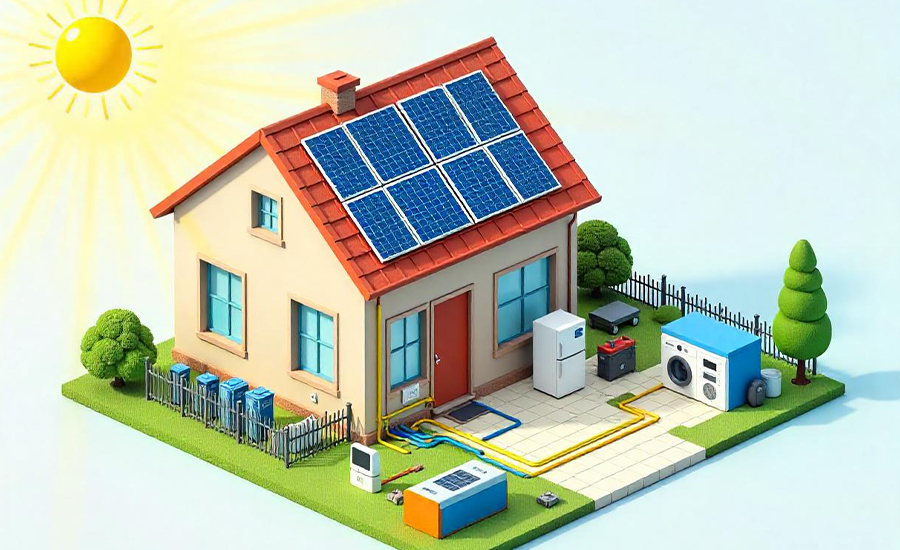
Let’s keep this simple. Your solar panels sit on your roof and soak up daylight. Inside each panel are small silicon cells that react to light. When light hits them, it knocks electrons loose — which sounds very science-y, but all you need to know is: this creates electricity.
But the solar power energy your panels create is called direct current (DC) — and your home runs on alternating current (AC). That’s where your inverter comes in.
Here’s the process, step by step:
- Daylight hits your panels
- Panels generate DC electricity
- The inverter converts it into usable AC
- Your home uses the energy for whatever’s switched on
- Any leftover power? You can store it or sell it back to the grid
It’s a bit like having your own mini power station on the roof.
What Comes with a Typical Solar Setup?
Most UK home systems include:
- Solar panels (obviously)
- An inverter, which is like the brain of the system
- A smart meter, to measure energy going in and out
- And optionally, a battery, to store any unused power for later
With Evergreen Power you also get an app so you can track How Do Solar Panels Work you’re generating and using in real time — great for spotting when you’re exporting loads of unused energy or timing your washing machine for peak production.
Do They Still Work on Cloudy Days?
Yes, they do. That’s one of the biggest myths out there.
Solar panels don’t need hot sun or blue skies — just light. Even when it’s overcast, there’s still plenty of light getting through the clouds. Sure, they’ll generate a bit less on a rainy November morning than a sunny day in June, but they’re still working.
In fact, cooler temperatures can help solar panels perform better, as they don’t overheat like most electronics—meaning that fresh spring days with a little cloud cover can be surprisingly efficient and positively impact the overall solar panels UK cost value
How Much Power Will You Actually Get?
This depends on a few things:
- The direction your roof faces (south is best, but east and west are still fine)
- How many panels you install
- Whether anything’s blocking the sun (trees, chimneys, nearby buildings)
- The time of year
A typical 4kW system in the UK can produce somewhere between 3,400 to 5,000 kWh per year — enough to cover most of your household usage.
And if you don’t use all that energy right away, you’ve got options.
What Happens to the Extra Energy?
You’ve got two main choices:
- Store it in a battery: That way you can use your solar energy at night or when it’s cloudy.
- Export it to the National Grid: Through the Smart Export Guarantee (SEG), your energy supplier pays you for whatever you send back. It’s like selling electricity from your roof.
Some people do both — use what they need, store a little, and sell the rest.
Still Connected to the Grid? Yes, You Are
Having solar doesn’t mean going completely off–grid, though some people choose to. In most cases, your home is still connected to the National Grid.
So if you need more electricity than your panels can generate (say, during a long winter night), you simply draw what you need from your usual supplier. The nice part? Your home uses your solar energy first. Only when that runs out does it pull from the grid. Why the UK Climate Is (Surprisingly) Ideal for Solar
Let’s bust the last big myth: the idea that the UK isn’t sunny enough for solar.
Sure, we don’t get the scorching rays of Spain or California. But we don’t need to. Our long daylight hours in spring and summer make up for the gloomier months. And because solar panels uk like cooler temperatures, they often perform more consistently in places like the UK than in baking-hot regions.
In short, we might grumble about the weather, but it’s actually working in our favour.
Final Thoughts: It’s More Practical Than You Think

Solar power isn’t just for techies, off-grid dreamers, or luxury eco-homes. It’s for everyday people who want to save money, reduce their energy bills, and be a bit kinder to the planet while they’re at it.
If your roof gets a decent amount of daylight and you’re staying in your home for a while, there’s no reason not to explore solar in 2025.
FAQs
1. Do solar panels work in winter?
Yes — they still produce energy, just a bit less due to shorter days and lower sun angles.
2. Can I run my home entirely on solar power?
Possibly — especially if you have a battery and use power efficiently. But most homes still stay connected to the grid.
3. Will solar save me money?
Definitely. Most UK households save 50–80% on their electricity bills.
4. Do I need planning permission?
Usually not. In most cases, solar panels are considered permitted development.
5. How long do panels last?
Most panels last 25 years or more, with warranties that cover 25+ years of output performance.
Written by: Kyler Walter

- Kyler Walter is a passionate advocate for renewable energy and sustainable living. As a leading voice at Evergreen Power UK, he specializes in solar energy solutions and has played a vital role in promoting innovative, eco-conscious technologies across the UK.
Latest entries
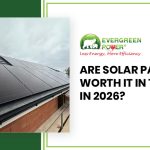 SolarJanuary 19, 2026Are Solar Panels Worth It in the UK in 2026?
SolarJanuary 19, 2026Are Solar Panels Worth It in the UK in 2026?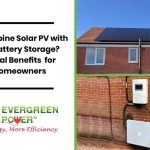 Solar BatteriesJanuary 9, 2026Why Combine Solar PV with Home Battery Storage? Practical benefits for UK homeowners
Solar BatteriesJanuary 9, 2026Why Combine Solar PV with Home Battery Storage? Practical benefits for UK homeowners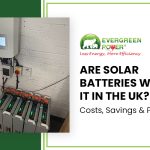 Solar BatteriesDecember 4, 2025Are solar batteries worth it in the UK? Costs, savings & payback
Solar BatteriesDecember 4, 2025Are solar batteries worth it in the UK? Costs, savings & payback  SolarNovember 6, 2025Do solar panels work in winter in the UK? What to expect
SolarNovember 6, 2025Do solar panels work in winter in the UK? What to expect
 020 3793 7323
020 3793 7323


